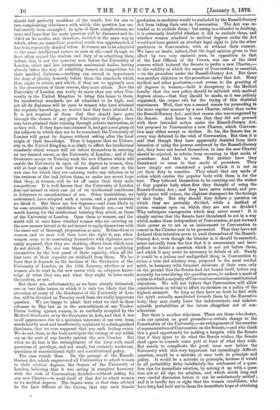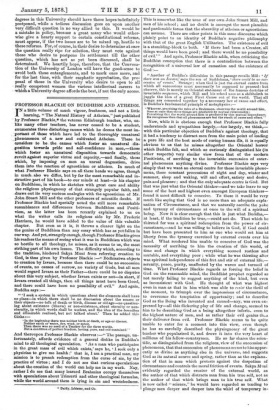THE UNIVERSITY OF LONDON AND WOMEN'S DEGREES.
ON Tuesday week, the 15th January, the Graduates of the University of London will have the opportunity of ac- cepting a new supplemental charter, opening all the degrees of their University,—in Arts, Science, Medicine, and Laws, —to the competition of women, on precisely the same terms as those on which they are offered to men. As the Graduates of the University, assembled in Convocation, have repeatedly expressed their desire that this should be done, we should feel perfectly confident of the result, but for one or two complicating side-issues with which this question has un- fortunately been entangled. In spite of these complications, we treat and hope that the main question will be discussed and de- cided on its merits, and, therefore, decided in the same way in which, when .no immediate practical result was apprehended, it has been repeatedly decided before. If women are to be admitted to the same intellectual careers as men at all,—and though we have often argued the wisdom and duty of so admitting them before, this is not the question now before the University of London, other and less scrupulous academical bodies having already taken the step of admitting women to competition for their medical diplomas,—nothing can exceed in importance the duty of placing honestly before them the standards which they ought to attain, and which, if they are to approach men in the prosecution of these careers, they must attain. Now the University of London can really do more than any other Uni- versity in the United Kingdom to bring this home to them. Its intellectual standards are all admitted to be high, and yet all its diplomas will be open to women who have attained the requisite knowledge, no matter how they have attained it. It is not required of them that they should have gone through the classes of any given University or College ; they may have attained their training through private instruction, or as-they will. If they have but attained it, and got a real grasp of the subjects in which they are to be examined, the University of London will grant its degrees without asking after the local origin of their knowledge. Thus it happens that no Univer- sity in the United Kingdom is so likely to affect the intellectual standards which women will set before themselves in entering on any learned career, as the University of London ; and if the Graduates accept on Tuesday week the new Charter which will enable the University to open all its degrees to women, they will at least make it sure that women shall not start in the new race for which they are entering under any delusion as to the easiness of the task before them, or under any secret hope that they, as women, will be let off easier than their male competitors. It is well known that the University of London does not intend to abate one jot of its intellectual conditions in deference to considerations of sex. Other institutions, we understand, have adopted such a course, and a great mistake we think it. But there are few degrees,—and none likely to be soon attainable by candidates of the female sex,—so well worth having for the intellectual training they attest, as those of the University of London. Open them to women, and the world will at once know whether women who are entering on the new careers intend or do not intend to equip themselves with the same sort of thorough preparation as men. Refuse them to women, and no man will then have the right to say, when women seem to be contenting themselves with diplomas more easily acquired, that they are shirking efforts from which men do not shrink. No one can blame them for not qualifying themselves by the best proof of their capacity, when all the beet tests of their capacity are withheld from them. We be- lieve that it depends on the decision of the Graduates of the University of London, on the 15th January, whether or not women are to start in the new career with an adequate know- ledge of what they are, and what they ought to have made themselves, or not.
But there are, unfortunately, as we have already intimated, one or two false issues, to which it is only too likely that the attention of many of the Graduates of the University of Lon- don will be diverted on Tuesday week from the really important question. We are happy to admit that what we said in these columns in May last as to the unworthiness of any Trades- Union feeling against women, is as cordially accepted by the Medical Graduates as by the Graduates in Arts, and that it was to all appearance due to a mistaken inference of our own from words hastily used and insufficiently explained by a distinguished Graduate, that we ever supposed that any such feeling exists.
We do not, then, in the least anticipate the raising of any selfish cry on the part of any faculty against the new Charter. But what we do fear is the entanglement of the issue with small questions of privilege, and not small, but certainly irrelevant, questions of constitutional right and constitutional policy.
The case stands thus. On the passage of the Russell- Gurney Act, which empowered all Universities to admit women to their medical degrees, the Senate of the University of London, believing that it was acting in complete harmony with the wish of Convocation, decided—without asking for any new Charter—to avail itself of that Act to admit women to its medical degrees. The Senate were at that time advised by the Law Officers of the Crown, that any such female graduates in medicine would be excluded by the Russell-Gurney Act from taking their seat in Convocation. The Act was in- tended so to exclude them ; but owing to a blunder in drafting, it is extremely doubtful whether it did so exclude them, and whether women admitted to medical degrees under the Act would not have gained an absolute legal right to join the other graduates in Convocation, with or without their consent.
We have no doubt, indeed, that the legal opinion given to this effect by two very eminent men, in opposition to that of the Law Officers of the Crown, was one of the chief reasons which induced the Senate to prefer a new Charter,— to the validity of which the assent of Convocation is essential, —to the procedure under the Russell-Gurney Act. But there was another objection to the procedure under that Act. Many medical and other graduates —not averse to the granting of all degrees to women,—held it derogatory to the Medical faculty that the new policy should be initiated with medical degrees alone,—that they should be made, as it was politely suggested, the corpus vile for the trying of this doubtful experiment. Well, that was a second reason for proceeding in the more regular manner by a new Charter, rather than under the Russell-Gurney Act ; and that reason also was recognised by the Senate. And hence it was that they did not proceed with their intended action under the Russell-Gurney Act, but proposed to Convocation a new Charter, which Convoca- tion may either accept or decline. So far, the Senate has in every way deferred to the wish of Convocation. But then it is said that though they have apparently desisted from their intention of using the powers conferred by the Russell-Gurney Act, they have not bound themselves, in case the new Charter should be rejected, to refrain from recurring to that mode of procedure. And this is true. But neither have they threatened to recur to that mode of procedure. They have simply not considered a point which it is not as yet their duty to consider. They admit that any mode of action which carries the popular body with them is for the best. They believed themselves to be carrying-out the wishes of that popular body when first they thought of using the Russell-Gurney Act ; and they have never evinced, and pro- bably never will evince, the slightest disrespect for the feelings of that body. But why should they debate a question on which they are probably divided, while a method of action remains open on which they are not so divided Why anticipate emergencies which may never occur ? It is simply untrue that the Senate have threatened to act in a way which makes them independent of Convocation, or put forward their power so. to act as an inducement to Convocation to concur in the Charter now to be presented. That they have not declared their intention never to avail themselves of the Russell- Gurney Act, even though the blunder in it should be amended, arises naturally from the fact that it is unnecessary and inex- pedient to debate a question which is not yet before them, and which it may never be necessary to debate at all. Surely it would be a jealous and undignified thing in Convocation to refuse a wise and salutary step, proposed in the most cordial spirit, in harmony with frequent decisions of their own, only on the ground that the Senate had not bound itself, before any necessity for considering the question arose, to eschew a mode of action to which a maj olity of Convocation entertain constitutional objections. We will not believe that Convocation will allow considerations so trivial to affect its decision on a policy of the highest moment. So long as they have no fault to find with the spirit actually manifested towards them by the Executive body, they may surely leave the indeterminate and indeter- minable probabilities of the future altogether out of con- sideration.
But there is another side-issue. There are those who desire, —in our opinion on good grounds—a certain change in the Constitution of the University,—an enlargement of the number of representatives of Convocation on the Senate,—and who think this a good opportunity for making a bargain with the Senate that if they agree to do what the Senate wishes, the Senate shall agree to concede some part at least of what they wish. But surely to complicate the great issue now before the University with this very important but exceedingly difficult question, would be a mistake at once both in principle and policy. It would be a mistake in principle, because it would in all probability delay indefinitely the settlement of a ques- tion ripe for immediate solution, by mixing it up with a ques- tion not at all ripe for solution, and which needs long and very careful discussion before it can be satisfactorily settled ; and it is hardly fair or right that the women candidates, who have long had held out to them the immediate hope of obtaining degrees in this University should have those hopes indefinitely postponed, while a tedious discussion goes on upon another very difficult question in no way allied to this. It would be a mistake in policy, because a great many who would other- wise give a hearty support to certain constitutional reforms, must appear, if the two issues are to be mixed up, hostile to these reforms. For, of course, in their desire to determine at once the question really ripe for solution, they must vote against those who desire to postpone its settlement till the other question, which has not as yet been discussed, shall be determined. We heartily hope, therefore, that the Convoca- tion of the University of London will have the good-sense to 'avoid both these entanglements, and to mark once more, and for the last time, with their emphatic approbation, the pro= posal of those in the University who desire to open to all really competent women the various intellectual careers to 'which a University degree affords the best, if not the only access.








































 Previous page
Previous page